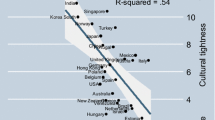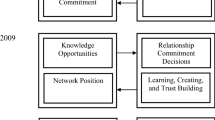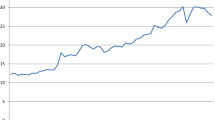Abstract
Given a huge variety of international relations in the age of globalization, business ethics needs to take them seriously in a differentiated way with great sensitivity and sophisticated understanding. This essay proposes to structure the field of business ethics by distinguishing three levels of analysis and four types of international relations. It builds on Richard T. De George’s pioneering work as an early leader in the field of business ethics. It is hoped that such differentiation may help to better identify the ethical responsibilities of all actors in business and the economy. The first part explains the extended three-level conception of business ethics with four types of international relations. The second part shows De George’s contribution to substantiate this conceptual framework. And the third part discusses the significance of this framework for better ways of securing human rights in international relations.


Similar content being viewed by others

Notes
The University of Notre Dame established the endowed chair of “international business ethics” with the donation of Arthur and Mary O’Neil (Chicago) in 1992 and appointed me first as visiting professor and then as tenured faculty.
The international discussion on business ethics has also influenced the very term of business ethics. Because it can be misunderstood in a narrow sense as the ethics of business organizations, the term “business and economic ethics,” which clearly includes all three levels of analysis, has been coined and is now being adopted internationally (see Rossouw and Stückelberger 2011).
For this semantic simplification De George was later criticized by Marvin Brown who elaborated a rich concept of integrity in Corporate Integrity: Rethinking Organizational Ethics and Leadership (Brown 2005).
Similar to De George and others, I dealt with moral rights and business ethics already in the 1980s, particularly in my habilitation in business ethics on the moral right to a minimal standard of living in the national and international context (Enderle 1987). However, I discussed the obligations to fulfill this right only from the micro- (individual and family) and macro- (state and developed countries) perspective, but not from the meso- (enterprise) perspective.
Another indication of this widespread ignorance is the fact that the English translation Business and Economic Ethics: The Ethics of Economic Systems (2006) of Arthur Rich’s masterwork Wirtschaftsethik I and II (1984 and 1990) was barely noticed in the United States.
Other actors at the meso-level to explore in terms of international relations are: professional associations, trade unions, consumer associations, sports confederations, charities, research institutes, military formations, cultural, religious, and other civil society organizations.
References
Blinder, A. (2013). After the music stopped. The financial crisis, the response, and the work ahead. New York: Penguin.
Brenkert, G. G. (1999). Richard T. De George: Competing with integrity in international business. Journal of Business Ethics, 22, 341–343
Brown, M. (2005). Corporate integrity: Rethinking organizational ethics and leadership. Cambridge, UK: Cambridge University Press.
Carroll, A. B., Lipartito, K. J., Post, J. E., Werhane, P. H., & Goodpaster, K. E. (2012). Corporate responsibility. The American experience. Cambridge, UK: Cambridge University Press.
Commission of the European Communities (CEC). 2001. Green Paper. Promoting a European Framework for Corporate Social Responsibility. COM(2001) 366 final.
De George R. T. (1967). Science and Ideology in Soviet Society (Co-author), New York: Atherton Press.
De George, R. T. (1968). The new marxism. New York: Pegasus.
De George, R. T. (1969). Soviet ethics and morality. Ann Arbor: University of Michigan.
De George, R. T. (1966). Patterns of soviet thought: The origins and development of dialectical and historical materialism. Ann Arbor: University of Michigan Press. (Paperback edition, 1970)
De George R. T. (1976). Marxism and religion in eastern Europe (Contributing co-ed.), Dordrecht: D. Reidel Publishing.
De George R. T. (1982). Business ethics (BE) (1st ed.). New York: Macmillan. (Subsequent editions in 1986, 1990, 1995, 1999, 2006, and 2010. Upper Saddle River, NJ: Prentice Hall)
De George, R. T. (1990). Using the techniques of ethical analysis in corporate practice. In G. Enderle, B. Almond, & A. Argandoña (Eds.), People in corporations: Ethical responsibilities and corporate effectiveness. Dordrecht: Kluwer Academic Publishers.
De George, R. T. (1993a). Competing with integrity in international business (CI). New York: Oxford University Press.
De George, R. T. (1993b). International business ethics: Russia and eastern Europe. Social Responsibility: Business, Journalism, Medicine, XIX, 5–23.
De George, R. T. (1997). Human rights and the multinational enterprise. Dilemma, 7(1), 6–14.
De George, R. T., Moorthy, R. S., Donaldson, T., Ellos, W. J., Solomon, R. C., & Textor, R. B. (1998). Uncompromising integrity: Motorola’s global challenge. Schaumburg, IL: Motorola University Press.
De George, R. T. (1999). Human rights and the multinational enterprise. In E. Kimman, A. Schilder, & F. Jacobs (Eds.), Drieluijk. Godsdienst. Samenleving. Bedrijfethiek. Amsterdam: Thela Thesis.
De George, R. T. (2010). Business ethics (BE) (7th ed.). Upper Saddle River, NJ: Prentice Hall.
De George R. T. (2012). A semantic and pragmatic analysis of responsibility and the implications for CSR. In B. Rok & J. Sokolowska (Eds.) Proceedings of the Fifth International Society of Business, Economics, and Ethics (ISBEE) World Congress, July 11–14, 2012. Warsaw, Poland: Kozminski University.
Donaldson, T. (1989). The ethics of international business. New York: Oxford University Press.
Donaldson, T. (1995). Book review: De George R. T. Competing with integrity in international business. Ethics, October, 215–217.
Donaldson, T., & Dunfee, T. (1999). Ties that bind. A social contracts approach to business ethics. Boston: Harvard Business School Press.
Enderle, G. (1987). Sicherung des Existenzminimums im nationalen und internationalen Kontext—eine wirtschaftsethische Studie [Securing the Minimal Standard of Living in the National and International Context—A Business Ethics Perspective]. Bern: Haupt.
Enderle, G. (1996a). A comparison of business ethics in North America and continental Europe. Business Ethics: A European Review, 5(1), 33–46.
Enderle, G. (1996a) Book review: De George, R. T. Competing with integrity in international business. Business Ethics Quarterly, 61(1), 117–122.
Enderle, G. (1999). Business ethics in the 21st century walks on two legs. In E. Kimman, A. Schilder, & F. Jacobs (eds.). Drieluijk. Godsdienst - Samenleving - Bedrijfsethiek. Liber Amicorum voor Henk van Luijk (pp. 185–189). Amsterdam: Thela Thesis.
Enderle, G. (2003). Business ethics. In N. Bunnin & E. P. Tsui-James (Eds.), The Blackwell companion to philosophy (2nd ed., pp. 531–551). Oxford: Blackwell Publishers.
European Commission (EC). 2011. A renewed EU strategy 2011–2014 for corporate social responsibility. COM (2011) 681 final.
Freeman, R. E. (1984). Strategic management: A stakeholder approach. Boston: Pitman.
Friedman, M. (1970). The social responsibility of business is to increase its profits. The New York Times Magazine. September 13.
Goodpaster, K. E. (1992). Business ethics. In L. C. Becker & C. B. Becker (Eds.), Encyclopedia of ethics (1st ed., pp. 111–115). New York: Garland.
Habermas, J. (2001). The postnational constellation: Political essays (M. Pensky. Trans.). Cambridge, MA: MIT Press.
Hook, L., Jack, A. (2013). China steps up GSK bribery probe. Financial Times, July 16.
Knight, G. (2013, January 4). Homeland security. Financial Times.
Küng, H., Leisinger, K. M., & Wieland, J. (2010). Manifest Globales Wirtschaftsethos. Konsequenzen und Herausforderungen für die Weltwirtschaft.—Manifesto Global Economic Ethic. Consequences and challenges for global businesses. Munich: Deutscher Taschenbuch Verlag.
Kuper, S. (2013). Borderlines: Photography special. Financial Times, January 4.
Mearsheimer, J. J. (2011). Why leaders lie. The truth about lying in international politics. New York: Oxford University Press.
Mishkin, S. (2013, July 30). Apple faces fresh accusations over conditions at China iPhone plants. Financial Times.
Ohmae, K. (1995). The end of the nation state. The rise of regional economies. How new engines of prosperity are reshaping global markets. New York: Free Press.
Rat der E. K. D. (2008). Unternehmerisches Handeln in evangelischer Perspektive. Gütersloh: Gütersloher Verlaghaus.
Rawls, J. (1971). A theory of justice. Cambridge, MA: Harvard University Press.
Rawls, J. (1993). Political liberalism. New York: Columbia University Press.
Reich, B. R. (2007). Supercapitalism: The transformation of business, democracy, and everyday life. New York: Knopf.
Rich, A. (2006). Business and economic ethics: The ethics of economic systems. With an introduction by G. Enderle (694 pp). Leuven: Peeters. [Arthur Rich, English translation of Wirtschaftsethik, Volume I 1984, Volume II 1990]
Rossouw, D., & Stückelberger, C. (Eds.). (2011). Global survey of business ethics in training, teaching and research. Journal of Business Ethics, 104(1), 1–101. Geneva: Globethics.net, 2012.
Ruggie, J. (2013). Just business. Multinational corporations and human rights. New York: Norton.
Shehadeh, R. (2013, July 27/28). A world of false frontiers. Financial Times.
The Economist. (2005). The good company. A sceptical look at corporate social responsibility. January 22–28.
The Economist. (2008). Just good business. A special report on corporate social responsibility. January 19.
Ulrich, P. (2008). Integrative economic ethics. Foundations of a civilized market economy. Cambridge, UK: Cambridge University Press.
Werhane, P. H. (1985). Persons, rights, and corporations. Englewood Cliffs, NJ: Prentice Hall.
Wiedenhöfer, K. (2013, January 4). Conflict zones. Financial Times.
Author information
Authors and Affiliations
Corresponding author
Additional information
In Honor of Richard T. De George
Rights and permissions
About this article
Cite this article
Enderle, G. Exploring and Conceptualizing International Business Ethics. J Bus Ethics 127, 723–735 (2015). https://doi.org/10.1007/s10551-014-2182-z
Published:
Issue Date:
DOI: https://doi.org/10.1007/s10551-014-2182-z



